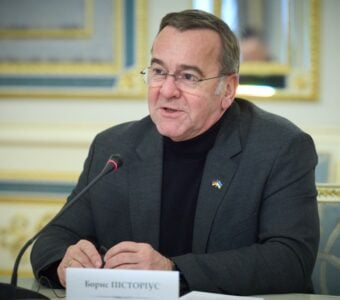Ukrainian NPPs cut production amid Russian shelling — IAEA

Photo: twitter.com/iaeaorg
On Sunday, November 17, during a large-scale Russian airstrike on Ukraine's energy infrastructure, several substations critical to the power supply of Ukrainian nuclear power plants were damaged. As a result, the plants were forced to reduce electricity production.
Rafael Mariano Grossi, the Director General of the International Atomic Energy Agency (IAEA), confirmed this, as reported by Rubryka.
"Operating Ukrainian nuclear power plants (NPPs) reduced electricity production this morning as a precautionary measure due to the extensive military operations across the country, which reportedly targeted energy infrastructure, thus increasing nuclear and physical security risks," Grossi said.
While the Khmelnytska, Rivne, and South Ukrainian NPPs did not suffer direct hits or halt operations, several electrical substations essential to their operation were further damaged during the strikes.
"The main power transmission lines from four substations have been disconnected. Currently, only two of the nine operating reactors in the country are producing electricity at full capacity," the report stated.
Grossi also noted that IAEA teams had visited seven substations outside nuclear power plants in September and October to assess damage from the August attacks. They will evaluate the need for additional visits following today's strikes.
"The IAEA teams working at the NPPs heard the sounds of air defense activity and took cover during air alarms. A loud explosion was heard at the Khmelnytska NPP, and two 330-kilovolt power transmission lines were unavailable at the Rivne NPP," the International Atomic Energy Agency reported.
It was stressed that nuclear power plants require a stable connection to the power grid, both to transmit the electricity they generate and to receive external power for reactor cooling.
"We are still assessing the full extent of the damage. At this critical time, I emphasize the importance of upholding the seven key principles of nuclear safety and security during conflict, including the fourth principle, which states that all nuclear facilities must have a reliable power supply from the external grid," Grossi said.
It should be noted that starting from Saturday evening, Russian forces launched attacks on Ukraine's energy sector using a variety of air-, land-, and sea-based missiles, as well as Shahed attack drones.
During the massive missile strike, Russian troops targeted several thermal power plants owned by the DTEK company, causing significant damage to power equipment.

Ukraine dismantles Kurakhove TPP in Donetsk region to repair other damaged power plants – WSJ
Комбінована ракетна атака рф 17 листопада
Combined Russian Missile attack on November 17
On the night of November 17, Russia launched a massive combined missile and drone attack across Ukraine. Seven Tu-95 bombers were detected taking off from Olenegorsk, Russia, as part of the assault, which included cruise and ballistic missiles, as well as drones later in the evening.
Explosions were reported in multiple regions, including Kyiv, Odesa, Zaporizhzhia, Dnipro, Kryvyi Rih, Rivne, and Cherkasy. In Kyiv, the air alert lasted nearly five hours, during which air defense forces intercepted several cruise missiles, "Kinzhal" and "Iskander-M" missiles, a hypersonic "Zirkon" missile, and approximately ten attack UAVs.
In Odesa, Russian forces specifically targeted the region's energy infrastructure, resulting in the deaths of two employees at a power facility.
In the Dnipropetrovsk region, two railway workers were killed at a depot, and in Lviv, a woman died from falling debris.
From the evening of November 16 through the morning of November 17, Russia launched a total of 210 air targets at Ukraine. Ukraine's air defense forces successfully destroyed 102 missiles and 42 drones.





















































